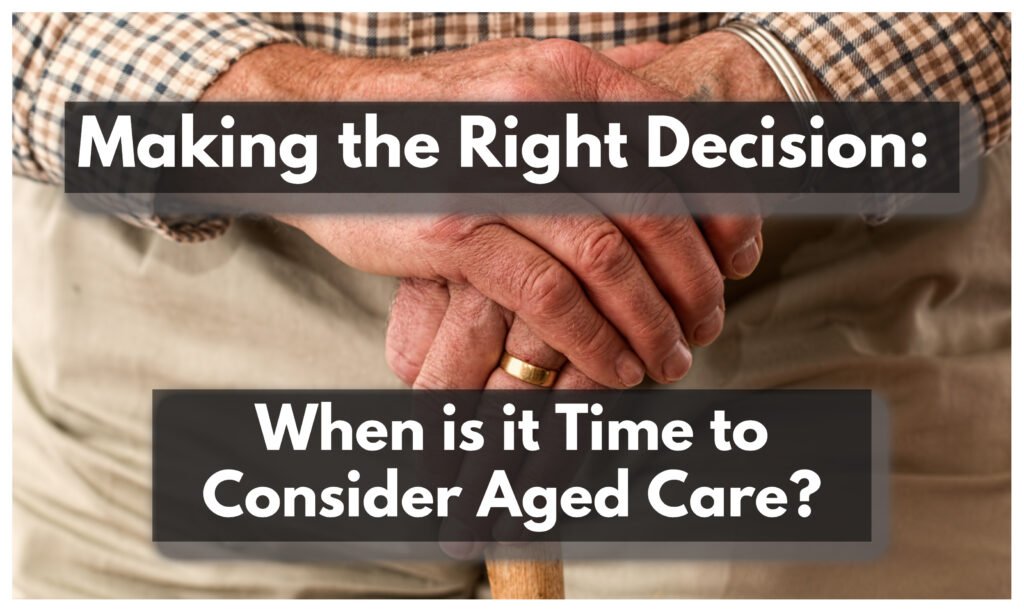Making the Best Decision: When is it Time to Consider Aged Care?

Last Updated on February 17, 2026 by Team MSW
Are you wondering if it’s the right moment to explore aged care options for yourself or a loved one? This significant life transition deserves thoughtful consideration and planning.
Making the decision to transition to aged care represents one of life’s most meaningful crossroads — a choice that balances independence with necessary support, dignity with safety, and familiar comforts with new opportunities. Rather than viewing this transition as surrendering independence, it’s helpful to see it as embracing a new chapter that prioritizes wellbeing and quality of life.
In this comprehensive guide, we explore the key indicators that suggest it might be time to consider aged care options. We’ll walk you through:
- Recognizing changes in health and mobility that may signal the need for additional support
- Understanding how cognitive changes might affect daily functioning and safety
- Identifying when social isolation becomes a concern for overall well-being
- Recognizing caregiver stress and its impact on family dynamics
- Navigating the financial considerations and government support available
By approaching this decision with knowledge and compassion, you can make choices that honor both immediate needs and long-term wishes. Remember, the ideal time to explore aged care options is before a crisis occurs — when you have the space to evaluate options thoroughly and make decisions without pressure.
Whether you’re considering in-home care that preserves the comfort of familiar surroundings, an assisted living facility that balances independence with community, or a nursing home that provides specialized medical support, this guide will help you understand your options and make informed decisions that respect individual preferences and circumstances.
When Is It Time to Consider Aged Care?
By equipping yourself with accurate information and insight, you can make well-informed decisions about aged care that prioritize wellbeing while respecting individual preferences and values.

Prefer to listen rather than read?
Understanding Aged Care Options
Choosing the right aged care arrangement is a deeply personal journey that reflects your current circumstances, lifestyle preferences, and vision for the future. Before committing to any particular path, take time to explore the full spectrum of services available, each designed with unique benefits to support different care needs.
1. In-Home Care
What It Offers:
In-home care provides personalized assistance while you remain in the familiar comfort of your own home. Caregivers help with daily tasks such as bathing, meal preparation, medication management, and light housekeeping.
Benefits:
- Familiar Environment: Maintaining your routine in a known space can help preserve independence and emotional well-being.
- Customizable Support: Services can be tailored to your schedule and specific needs, ensuring that you receive help only when necessary.
- Family Involvement: In-home care often complements the care provided by family members, adding an extra layer of support.
Considerations:
- Scheduling Flexibility: It may require coordinating visits with professional caregivers, which can sometimes be challenging.
- Home Modifications: Depending on your level of mobility, adjustments may be needed to ensure your home remains safe and accessible.
2. Assisted Living Facilities
What It Offers:
Assisted living facilities combine the comforts of residential living with access to support services. Here, seniors enjoy a blend of independence and communal care in a structured environment.
Benefits:
- Social Interaction: Regular activities and shared spaces promote socialization, helping to reduce feelings of isolation.
- Tailored Care Plans: Facilities often provide personalized assistance that adapts as your needs evolve.
- Ease of Transition: Moving into an assisted living community can offer a gradual transition from independent living while still retaining a level of autonomy.
Considerations:
- Community Living: Adapting to a communal setting might require some lifestyle adjustments, especially if you’re used to a private home.
- Varied Service Levels: The quality and scope of services can differ between facilities, so a careful evaluation is essential.
3. Nursing Homes/Residential Care
What It Offers:
Nursing homes, also known as residential care facilities, are designed for individuals who need intensive, around-the-clock care due to complex medical or physical conditions.
Benefits:
- 24/7 Medical Support: Professional healthcare is available at all times, ensuring immediate response to health concerns.
- Comprehensive Care: These facilities are equipped to manage chronic conditions and offer specialized programs for rehabilitation.
- Enhanced Safety: With constant supervision, nursing homes are ideal for individuals who may be at risk of falls or other emergencies.
Considerations:
- Higher Level of Care: The structured environment may limit some personal freedoms, so it’s important to align this option with your health priorities.
- Transitioning Challenges: Adjusting to a more clinical setting can take time and may require both emotional and practical support.
4. Memory Care
What It Offers:
Memory care units are specialized environments designed specifically for individuals with Alzheimer’s, dementia, or other cognitive impairments. These facilities feature secure settings and programs tailored to cognitive stimulation.
Benefits:
- Specialized Environment: Enhanced security measures (such as locked exits) ensure safety for residents prone to wandering.
- Targeted Programming: Activities are designed to stimulate memory and cognitive function, helping maintain a level of independence.
- Expertise in Care: Staff are specially trained to handle the challenges associated with memory loss, providing compassionate and informed care.
Considerations:
- Cost Implications: Specialized care often comes with higher costs, so financial planning is key.
- Adjustment Period: Transitioning to a memory care unit might be challenging for both the individual and their family, requiring careful discussion and planning with healthcare professionals.
By exploring these diverse options, you can better assess which type of care aligns with your lifestyle, health needs, and personal preferences. This deeper understanding not only empowers you to make an informed decision but also ensures that your chosen environment will support both your independence and overall quality of life.
Key Indicators That It May Be Time to Consider Aged Care
Deciding when to transition into aged care is a nuanced process. Instead of relying solely on isolated incidents, consider a broader picture of changes in health, safety, and social well-being. Here are some key indicators—and their deeper implications—that may signal the need for additional support:
1. Declining Health or Mobility
Even subtle changes in your physical abilities can be early signals that extra help is needed. For example:
- Everyday Tasks Becoming Overwhelming
- If activities like bathing, dressing, or cooking, which once were routine, now require significant effort or become unsafe, it might indicate that your physical resilience is waning.
- Increased Fatigue or Pain
- A noticeable drop in energy levels or frequent pain during movement can suggest that the body is under stress and may benefit from the structured care available in an aged care setting.
- Difficulty Managing Medications
- When the routine of managing prescriptions or keeping track of medical appointments becomes challenging, it could be an early sign of cognitive decline or physical limitations that require professional guidance to ensure both safety and well-being.
- Transitioning Challenges
- Adjusting to a more clinical setting can take time and may require both emotional support and practical assistance to help adapt successfully to new environments and routines.

2. Cognitive Changes
Cognitive shifts often occur slowly, making them harder to spot until they start to impact daily routines:
- Memory Lapses and Confusion
- Occasional forgetfulness can be normal, but if you find yourself repeatedly misplacing items or forgetting important appointments, this could be an early sign of cognitive decline that warrants attention.
- Difficulty Managing Medications
- When the routine of managing prescriptions or keeping track of medical appointments becomes challenging, it could indicate that professional guidance is needed to ensure both safety and well-being.
- Decision-Making Challenges
- Struggling with tasks that require planning or judgment—such as balancing a budget or planning meals—can also be indicative of diminishing cognitive function that might benefit from structured support.
3. Safety Concerns
Your home might start feeling less secure as physical or cognitive challenges emerge:
- Frequent Falls or Near-Misses
- If you’re experiencing more falls or even close calls while navigating your home, it suggests that your current environment may no longer be safe without modifications or professional oversight.
- Home Environment Limitations
- Changes in vision, balance, or reaction time can make once-familiar settings hazardous. While a few modifications might help temporarily, persistent issues often call for an environment designed specifically with enhanced safety features.
- Emergency Preparedness
- In a crisis, quick decision-making and swift movement are crucial. Diminished physical or cognitive capacity might mean that professional aged care, with built-in support systems, offers a safer living arrangement.
4. Social Isolation
Social connections play a critical role in overall health, and isolation can have serious implications:
- Reduced Engagement
- A noticeable decrease in social interactions can lead to feelings of loneliness and depression, which in turn may accelerate physical and cognitive decline.
- Loss of Community Ties
- If you find that you’re no longer able to participate in community events or maintain relationships with neighbors and friends, it might be time to consider a setting that fosters regular, meaningful social engagement.
- Emotional Well-Being
- Beyond the practical benefits of having company, a community environment often provides emotional support and a sense of belonging — key ingredients for a fulfilling life.

5. Caregiver Stress
When those who care for you start to struggle, it might be an indicator that professional aged care could be beneficial:
- Overwhelmed Family Members
- If loved ones are experiencing fatigue, frustration, or burnout while trying to provide care, it signals that the demands may have exceeded what informal support can sustainably offer.
- Quality of Care Concerns
- Persistent caregiver stress can inadvertently affect the quality of care, as even the most devoted family member might miss subtle changes in health or safety when overwhelmed.
- Balancing Emotions and Practicalities
- Recognizing that caregiver stress is a natural response to challenging circumstances can be a turning point—prompting a shift toward a more structured care environment that benefits everyone involved.
By weaving in the “why” behind each indicator and exploring how these changes affect daily life, you create a more engaging and original narrative. This approach not only informs but also connects with readers on a deeper level, encouraging them to reflect on their own experiences and consider a holistic view of aged care readiness.

Navigating Government Subsidies and Understanding Your Financial Situation
When considering aged care, a key component of the decision-making process is understanding how government subsidies and benefits can alleviate financial burdens, along with having a clear picture of your own financial situation. Here’s an integrated approach to help you navigate these important aspects.
Government Subsidies and Financial Assessments
Most countries have established comprehensive frameworks to evaluate financial eligibility for aged care services. These assessments help determine if you qualify for subsidized care and identify any out-of-pocket costs you may need to cover. The complexity of these frameworks can vary significantly:
- Varied Approaches:
In some countries — such as Australia — financial assessments involve detailed calculations of a person’s income, assets, and expenses. In other regions, the process might be simpler, requiring fewer calculations. Understanding the specific approach in your country is essential for accurate planning. - Types of Subsidies:
Governments typically offer a range of subsidies to help cover different care needs, including:- Home Care Subsidies: Assisting with the cost of in-home support services.
- Residential Care Subsidies: Helping with the expenses of living in a care facility that provides round-the-clock care.
- Respite Care Benefits: Providing temporary relief for family caregivers.
Knowing which subsidies you’re eligible for can significantly lower the overall cost of aged care. It is crucial to research these options early and understand the application process, as this knowledge can help you make informed decisions and plan for ongoing expenses.
Understanding Your Own Financial Situation
Before transitioning to aged care, take a comprehensive look at your financial resources. This includes:
- Current Income: Evaluate all sources of income, including pensions, investments, and any other earnings.
- Assets: Consider the value of your savings, property, and other investments.
- Future Costs: Estimate the potential expenses associated with aged care services, including any additional fees for specialized care, home modifications, or transportation.
- Long-Term Planning: Develop a financial strategy that accounts for potential changes in health needs and associated costs over time.
Budgeting for the Long Term
Aged care is often a long-term commitment, so it’s important to consider:
- Recurring Costs: Factor in recurring costs and potential increases over time, ensuring that your financial resources can sustain the level of care needed.
- Exploring Financial Advice: Consulting with a financial advisor who specializes in aged care planning can help you align your resources with your care options, ensuring that you’re prepared for both immediate and future needs.
By understanding your financial situation in tandem with available government subsidies, you can make a more informed decision regarding aged care options. This integrated approach ensures that you select a care model that is both financially sustainable and aligned with your long-term needs.

Assessing the Suitability of Aged Care Facilities
When evaluating aged care facilities, it’s essential to ensure they offer not only a safe and comfortable environment but also a setting that respects and accommodates the individual’s routines and personal values. Consider the following factors:
Tailored Routines and Personal Comfort
- Seamless Integration: The facility should be capable of integrating the resident’s established daily routines, ensuring a smooth transition from home life to a structured environment.
- Physical Safety and Comfort: Look for features such as well-designed layouts that minimize fall risks, accessible amenities, and private spaces that provide comfort and dignity.
Cultural Diversity and Inclusivity
- Cultural Sensitivity: A facility that embraces cultural diversity can significantly enhance a resident’s sense of belonging. This may include culturally specific meal options, celebrations of diverse traditions, and staff who are trained in cultural competency.
- Language and Communication: Consider whether the facility offers support in the resident’s preferred language and respects their cultural norms, ensuring personalized care and effective communication.
Quality and Range of Care
- Level of Support: Evaluate the type and level of care provided. Whether it’s assistance with daily living activities, specialized medical care, or memory support for cognitive impairments, ensure the facility’s services match the resident’s current and anticipated needs.
- Professional Expertise: The facility should employ well-trained, compassionate staff capable of adapting care plans as the resident’s health or circumstances change.

Social Interaction and Community Atmosphere
- Engaging Environment: A vibrant, inclusive community with opportunities for social interaction can alleviate feelings of isolation. Look for facilities that offer group activities, communal dining, and spaces for social gatherings.
- Overall Atmosphere: The ambiance of the facility should feel welcoming and homelike, providing both comfort and a sense of community that supports mental and emotional well-being.
Emotional Impact and Family Connections
- Emotional Well-Being: Recognize that the move to aged care is a significant emotional transition for both the resident and their family. Assess whether the facility provides emotional support through counseling services, social work support, or simply a caring and empathetic approach from the staff.
- Maintaining Family Bonds: Strong family connections are vital for a resident’s emotional health. Check if the facility encourages family involvement through flexible visiting hours, family events, and modern communication options, such as video calls, that help maintain these important relationships.
Wrapping It Up
Determining the right time to consider aged care involves a delicate balance of health, safety, and personal preferences. By carefully assessing your needs, exploring various care options, and consulting with experts, you can make a well-informed decision that enhances your quality of life. Remember, planning ahead and keeping an open dialogue with family and professionals is key to a successful transition.
Frequently Asked Questions About Aged Care Transitions
- How do I know if it’s the right time to consider aged care?
- Rather than looking for a single definitive sign, consider patterns of change in several areas: increasing difficulty with daily activities, safety concerns at home, cognitive changes affecting decision-making, social isolation, or caregiver burnout. When these challenges begin to impact quality of life despite available supports, it may be time to explore aged care options.
- What’s the difference between assisted living and nursing homes?
- Assisted living facilities provide support with daily activities while promoting independence in a community setting. Residents typically have their own apartments with access to communal dining and activities. Nursing homes offer more intensive, 24-hour skilled nursing care for those with complex medical needs or significant physical limitations, with a stronger focus on medical management and supervision.
- How can I prepare financially for aged care?
- Start by researching government subsidies and benefits available in your area. Then assess your income, assets, and potential care costs over time. Consider consulting with a financial advisor who specializes in senior care planning. Many aged care providers also have financial counselors who can help you understand payment options and eligibility for assistance programs.
- How do I help my loved one adjust to moving to an aged care facility?
- Prepare for the transition by visiting facilities together before making a decision. Personalize their new space with familiar items and photos. Maintain regular contact through visits, calls, and participation in facility activities. Be patient and acknowledge that adjustment takes time—typically three to six months. Work collaboratively with staff to address concerns and celebrate small victories during the adaptation process.
- Q: Can I receive aged care services while still living at home?
A: Yes, in-home care services are widely available and often the first step in the aged care journey. These services can range from basic household assistance and meal preparation to more comprehensive personal care and nursing support. Many government programs provide subsidies for in-home care, allowing seniors to remain in familiar surroundings while receiving necessary support. - Q: How do I evaluate the quality of an aged care facility?
A: Research accreditation and inspection reports, which are typically available online. Visit facilities multiple times, including unannounced visits during different times of day. Observe staff interactions with residents, cleanliness, activity programming, and dining options. Speak with current residents and their families about their experiences. Trust your instincts about the atmosphere and whether it feels respectful, engaging, and well-managed. - Q: What if my loved one refuses to consider aged care despite clear needs?
A: This common challenge requires patience and empathy. Focus conversations on enhancing safety and quality of life rather than losing independence. Consider involving trusted figures like family doctors in discussions. Start with less intensive options like in-home care. In cases of significant safety risks or cognitive impairment, seek guidance from healthcare providers or elder law attorneys about appropriate next steps. - Q: How do cultural considerations factor into aged care decisions?
A: Cultural background significantly influences preferences regarding care arrangements, food, activities, language, and end-of-life decisions. Many communities now offer culturally-specific aged care options. When evaluating providers, ask about staff cultural training, translation services, cultural celebrations, dietary accommodations, and whether they support specific religious or cultural practices important to your family.
Disclaimer
The content provided on MySeniors.World is for informational purposes only and is not intended as either financial or medical advice. Always consult a qualified professional before making any investment or health-related decisions.
Posts may contain affiliate links, meaning we earn a commission – at no additional cost to you, if you click through and make a purchase. Your support helps us continue providing valuable content.
REFERENCES
- World Health Organization. (2023). “Ageing and Health.” WHO Global Report on Falls Prevention in Older Age.
- National Institute on Aging. (2024). “Long-Term Care Facilities: Assisted Living, Nursing Homes, and Other Residential Care.”
- Alzheimer’s Association. (2023). “2023 Alzheimer’s Disease Facts and Figures.”
- AARP Public Policy Institute. (2020). “Caregiving in the U.S.”






Responses